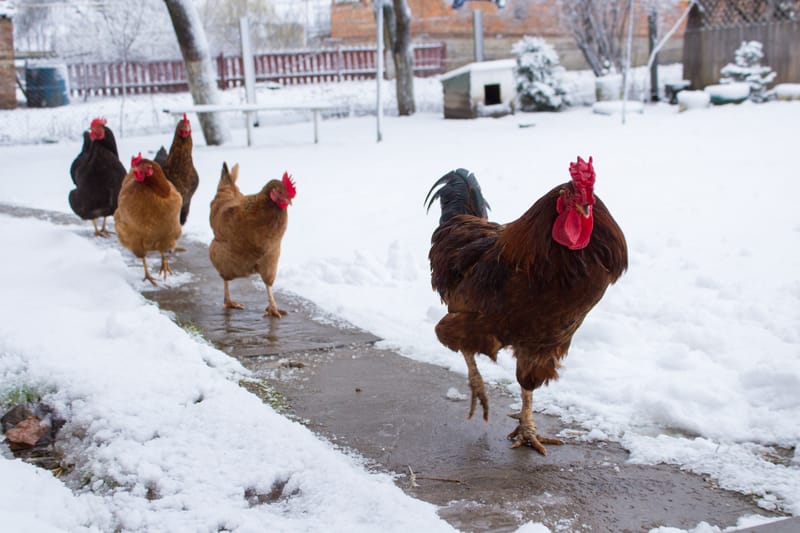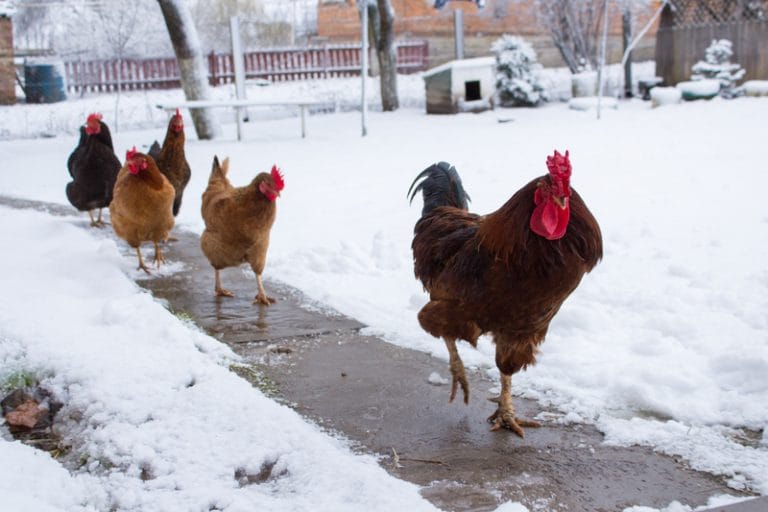This entry was posted on 27 July 2021 in Chicken Coops.

As chicken owners, we all want to keep our chickens happy, healthy, and comfortable all year round. During the winter months, your flock needs a little more care and attention to protect them from the cold weather. With the right preparation, however, you don’t have to worry about looking after your feathered friends.
Most breeds of chickens will be comfortable in cold temperatures with the right chicken coop. A high-quality chicken coop that’s consistently dry and well-insulated protects your flock from the cold elements and weather conditions. With the Noah’s Ark chicken coops, you can have peace of mind that your chickens are warm and cosy in their home because the structure is constructed from high-quality wood that offers improved insulation.
Chickens naturally acclimatise to different weather conditions, so caring for your chickens during colder months isn’t a challenge. You just need to plan and prepare in advance. So, even though it’s the summer, it’s time to set in motion how you’re going to look after your flock once the winter rolls in.
Once you’ve got a well-insulated, high-quality chicken coop, it’s time to prepare the chicken house for winter. You only have to focus on two key areas: making sure the chicken coop stays dry and warm. It’s a manageable task that you should be able to complete with a few simple solutions:
Chickens need the right feed and access to water all year round. During the winter months, you must adapt how you care for your chicken’s nutritional needs. Hens consume around 1.5 times more feed than they often do in summer and spring as chickens need to keep themselves warm during the colder winter months.
As well as feed, waterers need to be kept filled up so your chickens regularly have access to water. When the temperature drops below 0 degrees celsius, water may freeze in their containers. There are two ways to do this: invest in a heater or regularly refill the water so it doesn’t have the chance to freeze. Whichever option is right for your flock, keep an eye on your coop’s waterers so your chickens always have something to drink.
Even with a high-quality chicken coop, laying extra bedding is a great idea to help keep your flock warm and cosy. Lay down extra layers of straw, sand, or your choice of bedding. As always you should regularly lay fresh bedding down to avoid any damp materials building up in the coop. In the months before winter, stockpile on plenty of bedding so you’re set for the colder months.
A quick, but effective, way of managing your chicken’s bedding is the deep litter method. Instead of removing the dirty bedding once a week, you lay a fresh layer of bedding over the previous layer including any chicken poop. This method is easy to manage, gives your birds microbes to scratch, and leaves you with compost at the end. The only problem is chicken poop can cause ammonia, however, this won’t be a problem with the proper ventilation.
While large holes and gaps in the coop are not good for your chickens, neither is an airtight chicken house. If there isn’t proper ventilation, then ammonia can build up. Effective ventilation reduces the risk of ammonia and prevents dampness and moisture from spreading across the coop. Place vents at the top of the chicken house so any cold air doesn’t blow directly onto your chickens to make sure they’re still warm and comfortable.
Drafts and moisture are two of the biggest things to avoid during winter. When a cold draft seeps into your chicken coop this can impact your chicken’s wattles, combs, and feet. With the right maintenance, you can protect your flock from the outside elements to ensure the coop remains warm and dry.
Give the coop a once-over and look for any holes or gaps. Spotting these problems early is important so you can make sure your chicken coop is warm and dry. With new coops this shouldn’t be an issue, however, once you’ve owned the chicken house for a few years you need to maintain the coop regularly to protect your flock from cold weather conditions.
Caring for your chickens during winter begins with a high-quality chicken coop. If you keep backyard chickens and have a coop that is a few years old, make sure it’s still well-insulated. When it’s time to replace your chicken coop, don’t hesitate, to discover a high-quality chicken house that’s perfect for your flock with Cocoon Chicken Coops.

« Tips On Rehoming Battery Hens
Preparing Rabbits and Rabbit Hutches for the Changing of The Seasons: Autumn »